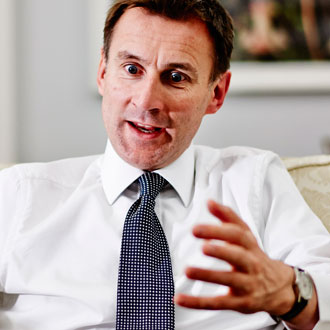The health secretary has promised he is ‘absolutely committed to reducing GP burnout’ and indicated he would do this by reviewing the model of 10-minute appointment slots.
Speaking in the House of Commons this morning, Mr Hunt said GP workforce concerns were a ‘very, very important issue’ that needed to be solved in order to tackle existing burnout within the profession.
Later, at the Best Practice conference in Birmingham, the health secretary said that he believed that the model of 10-minute appointments was responsible for the ‘hamster wheel’ feeling for overworked GPs.
In Parliament, he was responding to urgent MP questions about NHS England’s new five-year plan when he acknowledged problems of an impending swathe of GP retirements and a lack of investment in general practice.
He said: ‘We do have the demographic issue [of impending GP retirements] and that is why we are looking at how we can make it easier for GPs who have perhaps stopped practising, perhaps to go and have a family, to come back into the profession, how we can make it easier for GPs to do part-time work.
‘We are looking at all those issues because we are absolutely committed to reducing the burnout that a lot of GPs feel that they have at the moment by increasing the number of GPs that are actively practising.’
Related stories
NHS England to spend a ‘much higher proportion’ of budget on general practice over next five years
Read all about Pulse’s Battling Burnout campaign
Professor Malcolm Grant: ‘I am deeply conscious of the seriousness of GP burnout’
He told conference delegates: ‘One of the big changes that I want to see over the next five years are measures that have a dramatic impact on GP burnout. Because I think we have too many GPs who are retiring because of that sort of hamster wheel feeling, just working harder and harder with more and more people trying to see them and then not having the capacity to meet that demand.
‘And in particular I think there’s a pressure on trying to see someone with complex, long-term conditions in just a 10-minute slot. It’s very, very difficult to do that. So we recognise the long-term capacity issue, we have to be imaginative in the short term as well.’
Mr Hunt said he had been to the US with RCGP chair Dr Maureen Baker and they had seen the ‘holistic’ model of care offered.
He said: ‘We visited some really interesting not-for-profit, GP organisations in the United States. Where they have looked at models of holistic care, where they have different kind of structures to the kind of structures we have here: with a 10-minute appointment for one specific problem… the thing that stood out most in those new models, was the reduction in GP burnout.’
The news comes after NHS England bowed to demands from GPs expressed via Pulse’s ‘Battling Burnout’ campaign earlier this year by promising that all GPs will be provided with ‘high-quality’ occupational health if they need it.
Last month, NHS England debated funding for occupational health services in board meetings as GP leaders stressed the importance of keeping the issue on NHS England’s agenda.
Earlier, Mr Hunt told Parliament he welcomed NHS England’s five-year plan and promised that the Government was ‘calling time’ on the trend for NHS funding to be ‘sucked into the hospital sector’.
The proposals, which called for stabilising of GP core funding for two years and increased investment in primary care in the next five years, also stressed the importance of workplace wellbeing within the NHS and committed to reviewing ‘the strengthening of occupational health services’ working together with the Royal College of Occupational Health.

















